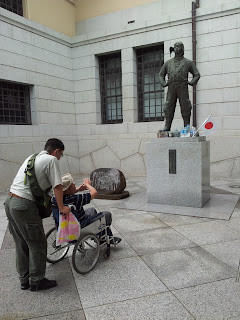Fukushima, Japan, atomic reactor 4 is a nuclear time bomb !
Our RTL coverage of Fukushima atomic plant, today.
For months I followed the situation in Fukushima and well often it is freaking mad to see what is happening. The news coverage was regular and we have done a lot on my part I have to say. Reporting, investigating, interviewing, trying to go beyond the secrets deployed by Japanese industry, government and those involved in the disaster. Today RTL opened a special chapter regarding the time bomb that Fukushima could be if a new natural disaster happens on the nuclear plant.
"The typhoon season will start soon in Japan. And it could cause a second Fukushima, far more terrible than the first. We confirm that the nuclear plant destroyed by an earthquake and a tsunami in March 2011, has become a "nuclear time bomb". At the heart of the installations, sleep 260 tons of highly radioactive rods in an unstable and hazardous pool building. A new natural disaster would be absolutely catastrophic for Japan and the whole world environment."
RTL France "Enquête", an investigation with Bernard Poirette of RTL Paris http://www.rtl.fr/biographie/bernard-poirette
with Th. Charles of the IRSN
and myself broadcasting from Japan:
"La centrale de Fukushima, une bombe nucléaire toujours instable" Click the URL links in red to listen to our special coverage on the morning news Friday August 24th 2012.
http://www.rtl.fr/actualites/environnement/article/la-centrale-de-fukushima-une-bombe-nucleaire-toujours-instable-7751851060
I would add that it is obvious that the Japanese atomic industry tries to hide the facts about Fukushima, and when we find about it, the Tepco and Co of the Japanese nuclear village say it is not totally new... Of course! This is why we have serious concerns about safety of the Japanese archipelago. Today Japanese are 60% against the nuclear energy, polls say, and the current prime minister Noda, as his predecessor Naoto Kan, announced desiring a progressive exit of the nuclear energy. Japanese, as I can see, have therefore voiced their concerns not only about this form of energy, but also politically have stated their opposition. It is to be seen if it will follow with effects, I see that the Yamaguchi prefecture governor has said he does not want to see nuclear energy restart. I read that we do not have energy black-out, and therefore the Oi plants seem unnecessary contrary to what it was said then to justify Oi plant in Fukui prefecture restart its reactors.
One politician Ozawa Ichiro (ex king maker of the LDP and the DPJ) stated he wants Japan out of nuclear. It remains to be seen how Japan will maintain its energy independence. Shifting from nuclear to oil and gas in a context where it is controlled geographically by oil producing countries is not easy policy. Other forms of technologies are to be studied, Japan could be a number One in new energy forms in this century. It has the technological and engineering capacity to create a new energy paradigm. It won't be easy.

Here is a GREAT BOOK "Dentsu to genpatsu hodo" written by Mr. Ryu Homma, 48 years-old, ex Hakuhodo Sales Division which reveals how Dentsu and other PR agencies control the Japanese (and foreign) media coverage of the Fukushima accident and the nuclear energy, focus especially on the role of "Dentsu" who keeps the journalists, scientists and opinion leaders who are critical of nuclear energy, away from Japanese media. Homma san wishes to be heard by world media as he wrote on Twitter: Ryu.Homma @desler
(Illus: beyondnuclear.org, emsnews.files.wordpress.com)

Asian Gazette Blog of Joel Legendre-Koizumi is licensed under a Creative Commons Attribution-ShareAlike 3.0 Unported License.
Asian Gazette Blog of Joel Legendre-Koizumi is licensed under a Creative Commons Attribution-ShareAlike 3.0 Unported License.




































